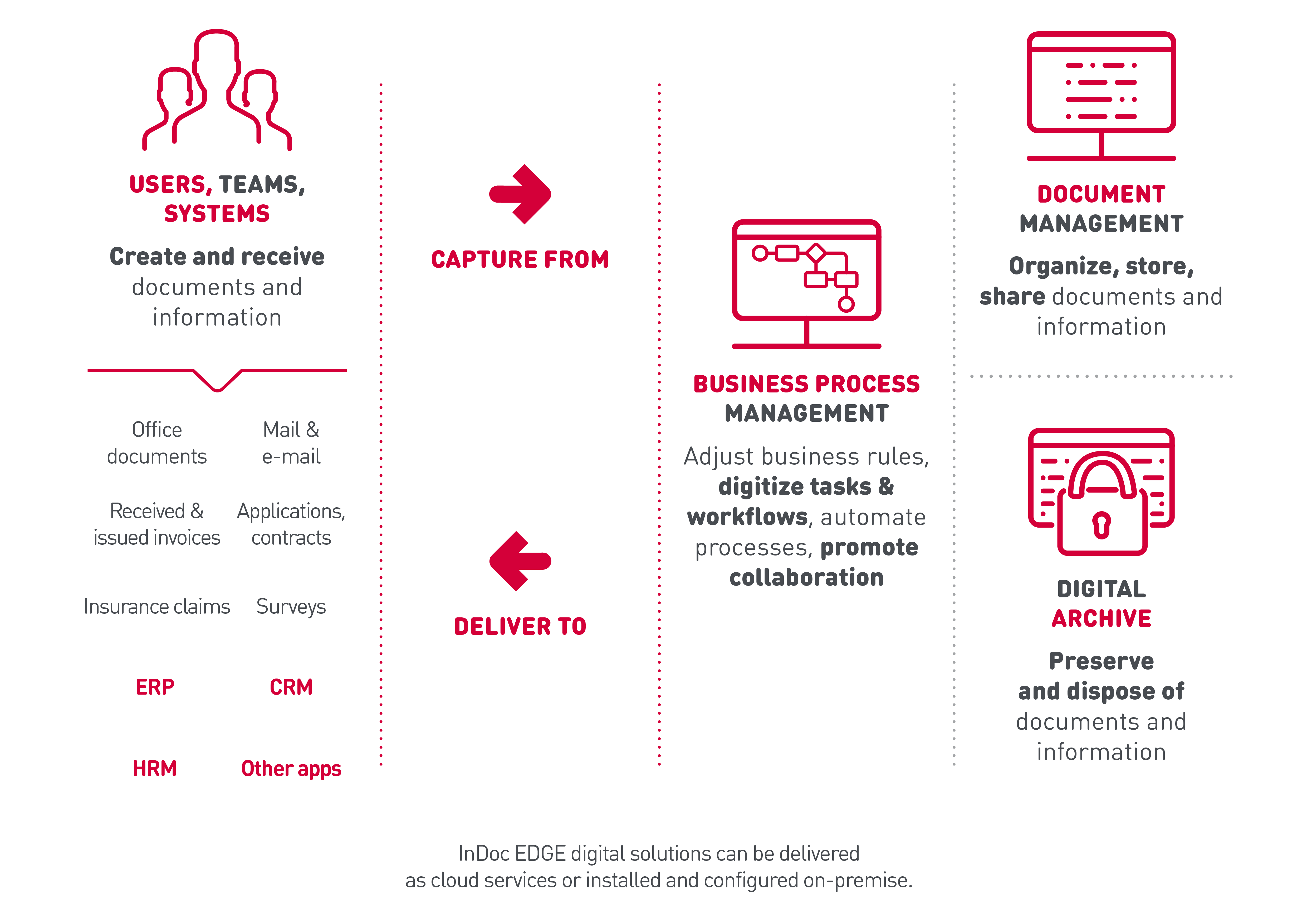5 building blocks of successful digital business
The success of the digitalization on the inside, where the organization strives to tame the data chaos and improve the efficiency of its operations, and on the outside, where it focuses on enhancing its customer experience and adapting to the challenges of the digital transformation, depends on how effectively the organization has implemented the key building blocks of digital business.

In the digital transformation process, businesses are faced with two major challenges. The first challenge refers to operational efficiency in the hybrid workplace, flexitime and the looming sense of uncertainty. Organizations need to ensure smooth implementation of business processes, facilitate information sharing and collaboration within the company, promote the development of digital competences of employees and maintain high employee engagement.
The second challenge is to ensure continuous improvement of the customer experience among people who are engaging with us through multiple channels, not all of them digital. As we attempt to address this challenge, we will have to reconsider our business model in the context of the company’s digital transformation and the ultimate optimization and automation of its business process performance. In order to be able to effectively address these challenges, a company needs to complete a comprehensive digitalization that will achieve greater effect than the sum of impacts of individual digital transformation building blocks.
Business process management
The key to tapping into the transformative potential of digitalization lies in the optimizing business operations and offerings aimed at adapting to the new digital reality. If we have opted for mere digitization of the existing processes and procedures , we are not likely to be satisfied with the effects of digitalization. We will only see increased costs and additional problems, but the customer experience will deteriorate as a result of failure to meet expectations. It is therefore critical to consider the potential of digital when transferring actions or rules from paper-based to digital operations.
When mapping the improvements and novelties, we should therefore start with a vision board which allows us to play out various hypotheses as we plan our objectives and key results (OKRs). Confirmed hypotheses help us optimize our operations and the new process variants will be digitized and automated whenever this is reasonable. The changes to the daily work routine have to be presented to all the parties involved in a very transparent manner; otherwise, the discomfort of having to adjust to something new may lead to employee resistance and dissatisfaction. The execution of processes and the achievement of the set key performance indicators must be regularly monitored and adjusted to changed circumstances. If needed, OKRs have to be revised and amended, and new improvements proposed. Business process management, which enables early learning and iterative improvement, is the first building block of successful digital business.

Document management and information sharing
As digitalization progresses, the quality and diversity of information increase, easily turning into information chaos, which affects our productivity and increases the likelihood of business risks. The answer to the present-day information chaos is effective document management and admittedly, document management is the key building block of digitalization for most companies.
Clearly, document management is much more than just keeping all the documents in one place. It also covers simple addition of documents, document creation from templates, secure and compliant document sharing, document editing, versioning and commenting, regular change updates, searches by content and metadata, accessibility anytime and anywhere, document integrity and authenticity, audit trail and prevention of loss in all phases of document life cycle ... Only such can ensure effective teamwork, compliance as well as risk mitigation.
E-signing of documents
E-signatures are becoming a common part of our everyday life: we use e-signatures to sign insurance policies, cash deposit slips in banks, and package receipts. In all core business processes, good customer experience is crucial for the success of digital operations. It is therefore essential that the signing procedure is as simple as possible, and that all parties required to use their e-signature in various business processes are provided with modern trust services they normally use. Plus, there are two things to always bear in mind: compliance and information security.

Storage of electronic documents
E-storage is that component of the company’s digital landscape that is often the last to be addressed, when all other, seemingly more important building blocks of digital business have already been integrated. However, we should never underestimate the challenge of ensuring the accessibility and usability of information, as well as the efforts needed to ensure the integrity, authenticity and permanence of business documents. Companies cannot afford to lose key data, or risk unauthorized document access or undetected content modifications, which is what increases the importance of secure e-storage.
Safe long-term e-storage, at one location, which protects the content form being modified, ensures the legal validity of stored materials and efficient risk management, is an important building block of successful digital business, which needs to be considered along with other important components.
Integration of information systems
In an organization that does not have a clear digitalization plan and lets organizational units handle the matter as they see fit, 'shadow IT' will quickly increase the number of applications in use and the overall complexity of the IT system. Fragmented information systems where problems are addressed through dedicated applications, which may seem easier or cheaper at first glance, restrict the iformation management potential.
Connectivity of IT systems is often the building block that is instrumental in ensuring successful digitalization. Modern solutions and services are easily connected via APIs and if, for example, certain process activities cannot be connected to our ancestor backend systems, we can use the capabilities of RPA tools and robotize certain tasks. It has to be noted, however, that in creating the conditions for successful digital transformation, advantage will belong to the companies that build their digital future on modern platforms that combine, by default, the key digitalization building blocks. These companies will be able to focus on their customer experience rather than having to cope with various integration challenges and will be quick to monetize this advantage.

Meet InDoc EDGE, an information management platform
Clearly, efficient and simple digital interaction with clients is turning into a key competitive advantage. To ensure excellent customer experience, we need to tap into the full potential of the digital and consider not only business process optimization and digitalization but also the connectivity of information systems, comprehensive document management, secure sharing of confidential information, user friendly e-signatures and secure e-storage. As you focus on your potential and work towards achieving it, it is essential to also maintain regulatory compliance and appropriate information security levels.
The InDoc EDGE information management platform is the answer. The platform combines the capabilities of data capture, document management and business processes with secure information sharing, electronic signatures and electronic storage in the Cloud or on site, enabling your to fully leverage the digitalization potential of your business and create your own digital story that is reliable and user friendly.

Want to know more? Contact us!



